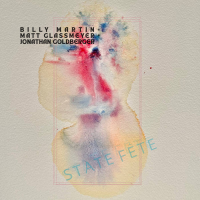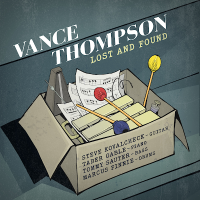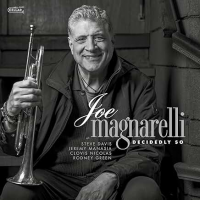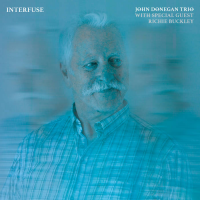Home » Jazz Articles » Album Review » Malachi Thompson: Blue Jazz
Malachi Thompson: Blue Jazz
The session starts with a promising premise—the celebration of free-bop’s (a term Thompson didn’t coin, but a style of his own design) 25th anniversary by enlisting a roster of estimable guests. Saxophonists Gary Bartz and Billy Harper are the highest profile figures, but fellow Chicagoans Ari Brown and Dee Alexander also make engaging, if brief, contributions.
The nine-member brass section gives the band a top-heavy slant, but Brown, Harrison Bankhead and Leon Joyce, Jr. do an admirable stint as rhythm section counterweight. Bartz and Harper are the undisputed heavyweights, but their contributions end up oddly subdued in places. It’s almost as if Thompson’s reluctance to unleash the pair’s full powers for fear of compromising the more egalitarian aspects of the band as a whole. Considering their out- numbered odds it would’ve been a thrill to hear the saxophonists take on the marshaled might of the brass section together and individually. Sadly, the opportunity for these sorts of amiable confrontations is largely passed up.
Thompson chooses instead to trace another one of his highly stylized timelines through jazz history. Divided into two orchestral sections “Black Metropolis Suite” and “Blues for a Saint Called Louis Suite” the disc puts the AACM’s credo of “Great Black Music: Ancient to the Future” into creative practice. A final trilogy of tunes that includes Wayne Shorter’s “Footprints” completes the package. The pieces draw collectively on a lineage linking the Dixieland roots of Satchmo through the piquant modern gumbo that is jazz today. Thompson’s large-scale charts are sturdy, but they sometimes sound derivative. The relative economy of brass solos is also kind of surprising. The leader, Berry and McFarland devour the lion’s share of statements, but more often the section is used en mass as a source of sliding harmonies and thrust.
The bright head of “Black Metropolis” is but one example. Expanding on the catchy melody the band breaks apart into rhythm-plus-soloists configurations starting with Thompson switching to Bartz and Harper. The brass section is basically left riffing on the breaks between. Other pieces rely on equally hook-laden structures and incorporate vocals along with the occasional instance of free interplay as on the atmospheric “Genesis/ Rebirth.” With “Mud Pie” Thompson even dips into some funky organ grooves coupling Brown’s keys with the booting saloon sax of “Daddy G” Barge and the gruff shouts of The Big Doowopper. While the overall program is a bit underwhelming, quite a bit of enjoyable jazz sifts to the surface in sectional moments of inspiration.
Track Listing
Black Metropolis/ The Panther/ Jaaz Revelations/ Genesis/Rebirth/ Po
Personnel
Malachi Thompson
trumpetMalachi Thompson- trumpet, flugelhorn; Gary Bartz- alto & soprano saxophones; Billy Harper- tenor saxophone; David Spencer, Kenny Anderson, Micah Frazier, Elmer Brown- trumpets; Tracy Kirk, Steve Berry, Bill McFarland, Omar Jefferson- trombones; Kirk Brown- piano, organ; Harrison Bankhead- bass; Leon Joyce, Jr.- drums; Dee Alexander- vocals; Ari Brown- tenor saxophone, clarinet; Gene
Album information
Title: Blue Jazz | Year Released: 2003 | Record Label: Delmark Records
Tags
PREVIOUS / NEXT
Support All About Jazz
 All About Jazz has been a pillar of jazz since 1995, championing it as an art form and, more importantly, supporting the musicians who make it. Our enduring commitment has made "AAJ" one of the most culturally important websites of its kind, read by hundreds of thousands of fans, musicians and industry figures every month.
All About Jazz has been a pillar of jazz since 1995, championing it as an art form and, more importantly, supporting the musicians who make it. Our enduring commitment has made "AAJ" one of the most culturally important websites of its kind, read by hundreds of thousands of fans, musicians and industry figures every month.























